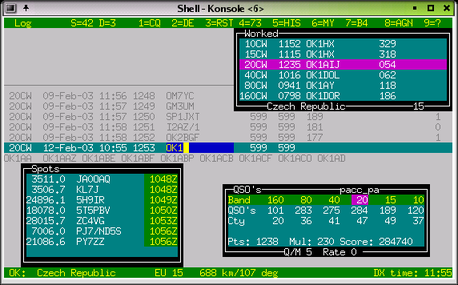 a Linux based ham radio contest logger
a Linux based ham radio contest logger
This is the new home for the TLF project. This project has been taken over from Rein Couperus, PA0R, in 2009 by Thomas Beierlein, DL1JBE, for maintenance and further development.
TLF is a curses based console mode general logging and contest program for amateur radio.
It supports numerous contests, including CQWW, WPX, ARRL-DX, ARRL-FD, PACC and the EU SPRINT shortwave contests, and also has general QSO and DXpedition modes.
It interfaces with cwdaemon or winkeyer daemon for morse code generation and with your sound card for CW/voice keying, connects to many radios via the hamlib library, and has a built-in client for DX cluster connection.

Main Features
-
Network based CW Keyer 6-60 wpm with 24 CW messages
-
Integrated voice keyer (14 messages)
-
Auto-CQ
-
Built-in contests
-
User-defined contests for those not yet included
-
DX-pedition and QSO modes
-
DXCC database
-
Intelligent dupe checking
-
Radio control via the hamlib library for many transceivers
-
MUF calculator
-
IP networking for M/S or M/M operation
-
Built-in telnet client and TNC terminal for cluster connection
-
Nearly TRLog output compatible
-
Configurable Cabrillo output
Some more minor features
-
Built-in CW practice simulator to learn TLF (simulated CQWW running)
-
On-line log file sync over the network
-
Band info output on parallel port (top ten decoder compatible)
-
RTTY contesting with gMFSK or Fldigi (soundcard programs)
-
Sound recorder facility to record voice keyer messages and complete contest.
-
CQWW (SO, M/S and M/M)
-
WPX (SO, M/S and M/M)
-
ARRL Sweepstakes (SO, M/S )
-
EU SPRINT
-
EUHFC
-
ARRL-DX (both sides)
-
ARRL-FD
-
ARRL 10m
-
ARRL 160m
-
Region1 field day
-
SP DX contest
-
PACC (both sides)
-
NRAU - scandinavian
-
Wysiwyg mults mode (per band or per contest)
-
WAEDX (New in TLF-1.2.2 See doc/README_QTC.txt)
Download and Installation
You can download the source code for the last packaged version (TLF-1.4.1) here. It must be compiled after unpacking, and has some dependencies that must be installed first. See the README.md in the main repository for details.